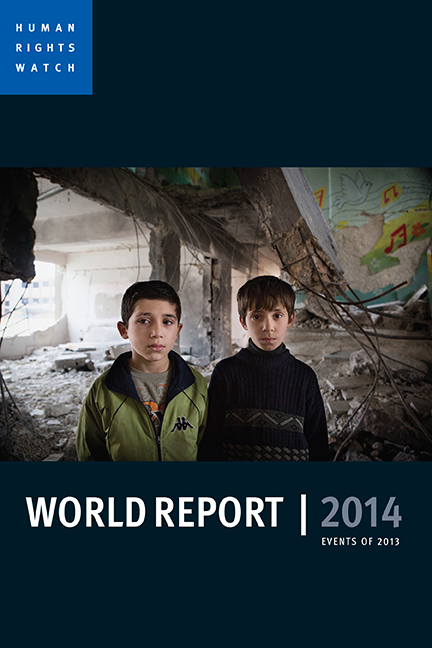Book contents
- Frontmatter
- Dedication
- HUMAN RIGHTS WATCH
- Table of Contents
- Foreword
- Rights Struggles of 2013: Stopping Mass Atrocities, Majority Bullying, and Abusive Counterterrorism
- The Human Rights Case for Drug Reform How Drug Criminalization Destroys Lives, Feeds Abuses, and Subverts the Rule of Law
- Putting Development to Rights: Integrating Rights into a Post-2015 Agenda
- The Right Whose Time Has Come (Again) Privacy in the Age of Surveillance
- Photo Essays
- AFRICA
- AMERICAS
- ASIA
- EUROPE AND CENTRAL ASIA
- MIDDLE EAST AND NORTH AFRICA
- UNITED STATES AND CANADA
- 2013 HUMAN RIGHTS WATCH PUBLICATIONS
- Acknowledgments
Côte d’Ivoire
Published online by Cambridge University Press: 07 May 2022
- Frontmatter
- Dedication
- HUMAN RIGHTS WATCH
- Table of Contents
- Foreword
- Rights Struggles of 2013: Stopping Mass Atrocities, Majority Bullying, and Abusive Counterterrorism
- The Human Rights Case for Drug Reform How Drug Criminalization Destroys Lives, Feeds Abuses, and Subverts the Rule of Law
- Putting Development to Rights: Integrating Rights into a Post-2015 Agenda
- The Right Whose Time Has Come (Again) Privacy in the Age of Surveillance
- Photo Essays
- AFRICA
- AMERICAS
- ASIA
- EUROPE AND CENTRAL ASIA
- MIDDLE EAST AND NORTH AFRICA
- UNITED STATES AND CANADA
- 2013 HUMAN RIGHTS WATCH PUBLICATIONS
- Acknowledgments
Summary
During 2013, the government of President Alassane Ouattara made progress in creating the legislative framework for greater respect for human rights and in ensuring better discipline within the security forces. Inadequate headway was made in strengthening the judiciary's independence, ensuring accountability for crimes committed during the 2010-2011 post-election crisis, and addressing root causes of the country's decade of violence—notably impunity, corruption, land conflict, and the proliferation of small arms.
Security force abuses decreased from 2012, in part due to government efforts. However, members of the security forces continued to engage in numerous human rights violations and acts of criminality, including arbitrary arrests, cruel and inhuman treatment of detainees, and extortion at checkpoints.
One-sided justice for the post-election crisis undermined reconciliation and, together with ongoing weaknesses within the judiciary, hindered progress in establishing the rule of law. While Ivorian authorities have investigated and charged numerous supporters of former President Laurent Gbagbo for their role in the post-election violence, there has been a near complete absence of accountability for serious crimes committed by President Ouattara's forces. The government made some efforts to improve access to justice for other crimes, including by opening a new tribunal in western Côte d’Ivoire, but corruption and the judiciary's lack of independence remain a general concern.
The country's security situation improved, though land conflict simmered in western Côte d’Ivoire with ineffective government response, contributing to several cross-border attacks from Liberia and small-scale inter-communal violence. As disarmament proceeded slowly, the country remained awash in guns, often in the hands of disgruntled former combatants.
Some of Côte d’Ivoire's partners, notably the United Nations and the United States, showed more willingness to criticize the lack of accountability for past crimes, while others, particularly France, remained largely silent. The International Criminal Court continued investigations, though many Ivorians criticized the lack of progress in the investigation of crimes by pro-Ouattara forces.
National Justice for Post-Election Violence
The Ouattara government has failed to deliver on its promise to render fair and impartial justice for crimes committed during the 2010-2011 post-election crisis. This crisis was the culmination of a decade of politico-ethnic conflict in which security forces, rebel forces, and allied militia groups regularly committed serious crimes with complete impunity.
- Type
- Chapter
- Information
- World Report 2014Events of 2013, pp. 96 - 102Publisher: Bristol University PressPrint publication year: 2014

